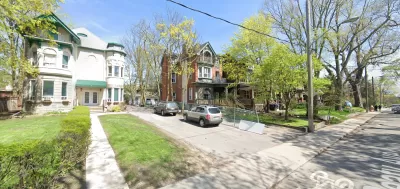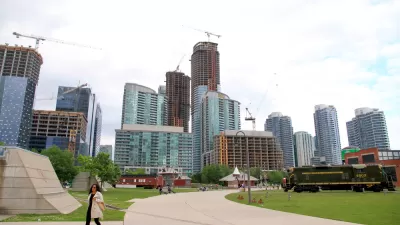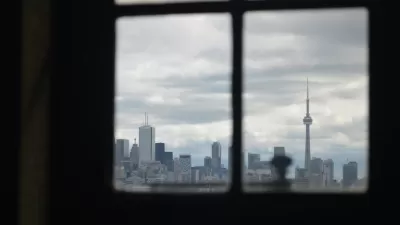Toronto could legalize rooming houses, also known as multi-tenant or lodging houses, in an effort to bring the city's many unpermitted examples of this low-income affordable housing type up to humane standards of health and safety.

"Toronto’s inconsistent rules about rooming houses — banned in some areas and unregulated in others — have led to tenants living in dangerous conditions," reports Victoria Gibson, sharing the details of a recent report by city staff that recommends legalizing and licensing rooming houses city wide.
"Rooming houses — also called multi-tenant or lodging houses — are an especially affordable form of housing, with tenants renting by the room. They are one of the few private market options for those on government support or low incomes," explains Gibson.
Rooming houses are prohibited in large swaths of the city, but they are found all over the city anyway, a reality that creates dangerous situations for residents. "Often that means houses are run without appropriate permits or inspections," according to Gibson. "Building operators can’t upgrade buildings if they fail to meet requirements like the fire code, because the city can’t issue building permits for rooming houses where they aren’t permitted."
Toronto's consideration of its rooming houses stock comes just a few weeks after the city of Vancouver announced an ambitious plan to pursue $1 billion to purchase single-family occupancy buildings to develop and maintain as affordable housing in the city, in addition to another $30 million.
FULL STORY: Legalize rooming houses across Toronto to make them safer, says city report

Alabama: Trump Terminates Settlements for Black Communities Harmed By Raw Sewage
Trump deemed the landmark civil rights agreement “illegal DEI and environmental justice policy.”

Planetizen Federal Action Tracker
A weekly monitor of how Trump’s orders and actions are impacting planners and planning in America.

Why Should We Subsidize Public Transportation?
Many public transit agencies face financial stress due to rising costs, declining fare revenue, and declining subsidies. Transit advocates must provide a strong business case for increasing public transit funding.

Understanding Road Diets
An explainer from Momentum highlights the advantages of reducing vehicle lanes in favor of more bike, transit, and pedestrian infrastructure.

New California Law Regulates Warehouse Pollution
A new law tightens building and emissions regulations for large distribution warehouses to mitigate air pollution and traffic in surrounding communities.

Phoenix Announces Opening Date for Light Rail Extension
The South Central extension will connect South Phoenix to downtown and other major hubs starting on June 7.
Urban Design for Planners 1: Software Tools
This six-course series explores essential urban design concepts using open source software and equips planners with the tools they need to participate fully in the urban design process.
Planning for Universal Design
Learn the tools for implementing Universal Design in planning regulations.
Caltrans
Smith Gee Studio
Institute for Housing and Urban Development Studies (IHS)
City of Grandview
Harvard GSD Executive Education
Toledo-Lucas County Plan Commissions
Salt Lake City
NYU Wagner Graduate School of Public Service





























